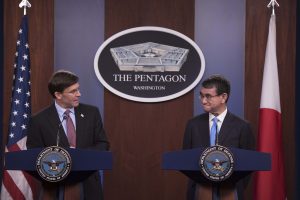Earlier this week, Japanese Defense Minister Taro Kono traveled to Hawaii to visit an Aegis Ashore missile defense site, and to Washington to meet his U.S. counterpart, Defense Secretary Mark Esper. On the same day as Esper hosted Kono in Washington, Japanese Foreign Minister Toshimitsu Motegi and U.S. Secretary of State Mike Pompeo were meeting in Silicon Valley. In both meetings, the strength of the 60-year-old alliance was reaffirmed and celebrated. From coast to coast, the discussion on Tuesday was dominated by current tensions in the Middle East, China’s maritime activities, and North Korea’s ongoing weapons development.
Kono started his trip on Monday with a stop at the Pacific Missile Range Facility on the island of Kauai. After observing the test site, Kono told reporters, “By utilizing the Aegis Ashore system, we’ll secure Japan against North Korean missiles. … We want to deploy [the missile defense units] as soon as possible.” This statement is in line with the Japanese government’s policy, but may not assuage concerns held by the local residents in Akita and Yamaguchi, two possible sites for hosting the Aegis Ashore system in Japan.
Much of Kono’s public speech the following day at the Center for Strategic and International Studies, a Washington-based think tank, covered expected ground – the origins and evolution of the U.S.-Japan alliance, the strategic value of U.S. bases in Japan to U.S. security interests, the importance of South Korea as a security partner to Japan, and warnings about the broader international consequences of China’s unilateral maritime activities in the East and South China Seas. But there were some surprises, especially for a predominantly American audience, including Kono’s call to work more closely with Russia against China and to offer greater assistance to states like Cambodia and Myanmar instead of punishing these regimes for their anti-democratic, illiberal behavior.
“You may frown at me, proposing to work with Russia,” Kono acknowledged, “but by looking at Russia from the east side of the country, we can see that we potentially share mutual interest with Russia in areas dealing with China.”
He also cautioned, “Myanmar and Cambodia are in the process of advancing their democracy. At this stage, the problems in these countries are drawing attention. But if we hesitate to lend our hands to them, citing the problems, they may be dragged into [a] debt trap by China. As a result, they will be back to authoritarianism.”
Kono also used the speech as an opportunity to try to shape China’s behavior in the lead up to Chinese President Xi Jinping’s expected state visit to Japan this spring. “We want to extend our heartfelt welcome to President Xi for his visit. China needs to work harder to improve the situation [regarding the frequent activities of the PLA in the East China Sea], otherwise, we may find a difficult environment for the visit,” he noted. “International norms, such as freedom, democracy, and legal order, have been built up and maintained by countries including Japan and the United States, and others, overcoming many difficulties. If China makes light of the international norms, they have to pay the cost. We need to create an environment where costs will be imposed on China in cooperation with the international community.”
Interestingly, during the public speech, no mention was made of Iran or ongoing tensions in the Middle East despite the attention the Japanese government is putting on the issue, with Prime Minister Shinzo Abe personally visiting the region. However, that came up during Kono’s meeting with Esper. During the press conference, Esper thanked Kono for Japan’s decision to deploy its Self-Defense Force assets to the Gulf of Aden, Gulf of Oman, and the Arabian Sea. Other items discussed included North Korea and China.
In Silicon Valley, Pompeo also reassured Motegi that the United States values Japan’s efforts in the Middle East, even if Japan is not participating in the American-led Operation Sentinel. Motegi voiced “deep concern” about heightened tensions, and urged all parties to make efforts to reach a diplomatic solution. China was also discussed, as was North Korea, including in three-way discussions with South Korean Foreign Minister Kang Kyung-wha.
As strong as the U.S.-Japan alliance may be at the bureaucratic level, as these two meetings exemplified, such claims ring somewhat hollow when neither Esper nor Pompeo mentioned U.S. Donald Trump’s demands that Japan quadruple host nation support. Though common threats cement the bilateral relationship, the biggest issue in the alliance today is the U.S. president and his inability to understand the nonmonetizable strategic value that the alliance provides to U.S. security.

































